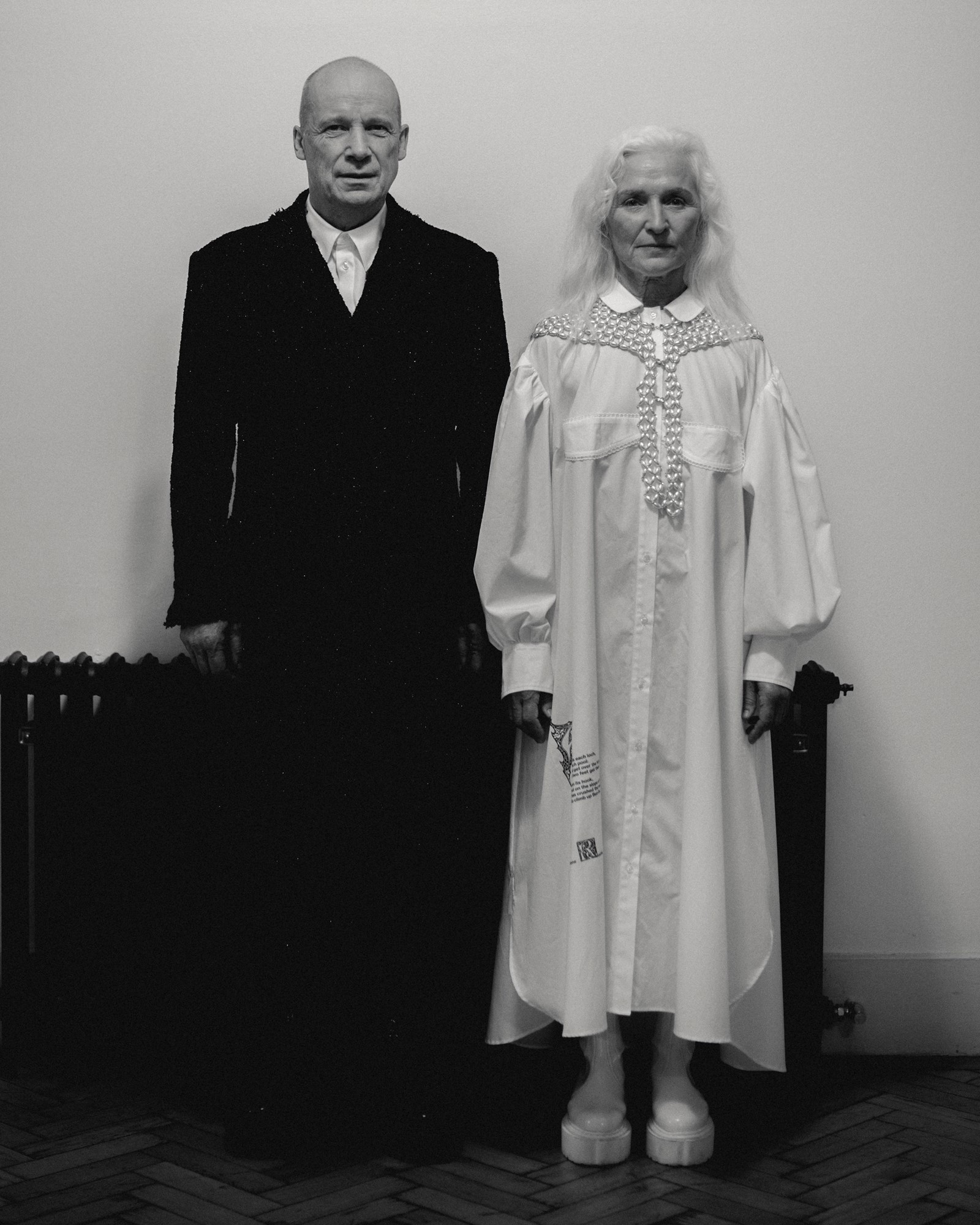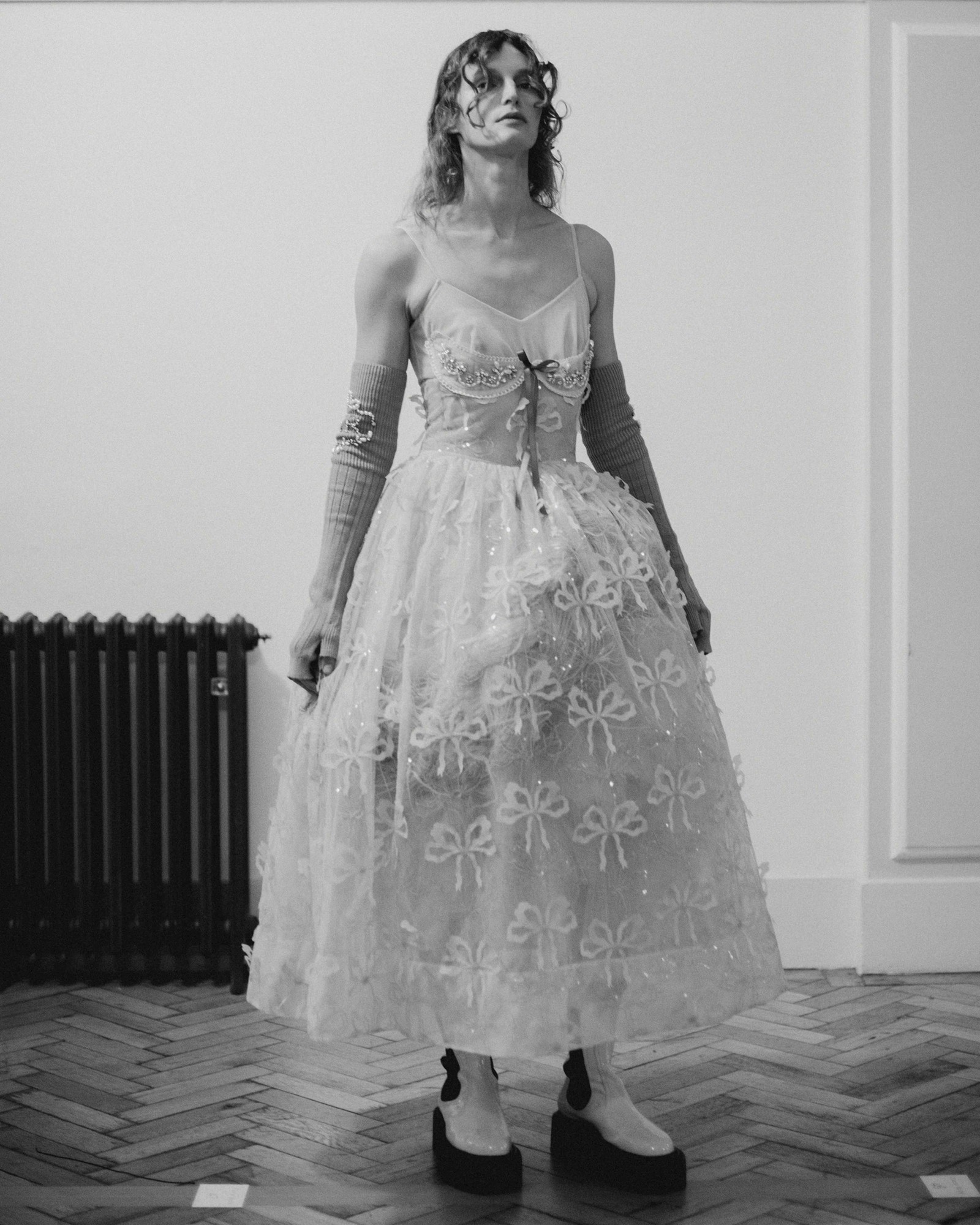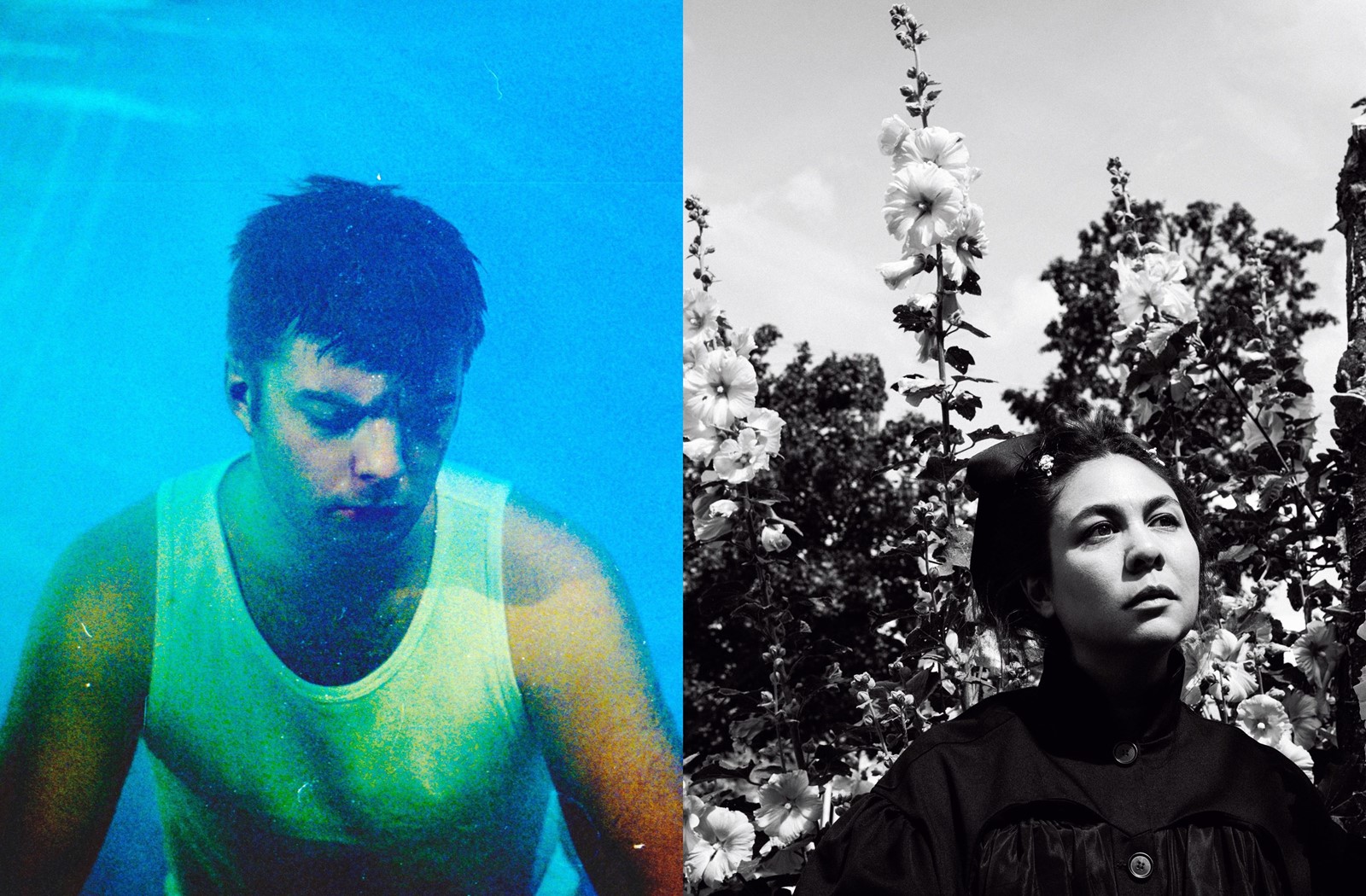Simone Rocha and Fontaines DC frontman Grian Chatten can’t remember exactly how they first met. It might have been through Rocha’s partner, cinematographer Eoin Mcloughlin, who has worked on music videos for Chatten alongside a mutual friend, director Hugh Mulhern. Or it could have been one night at the house of other mutual friends, painter Peter Doyle and photographer Eimear Lynch – “you were making cocktails for everyone,” says Chatten. Or maybe it was at the Irish pub The Auld Shillelagh, a Stoke Newington institution. However it did happen, and you quickly get the sense they’re part of a tight knit, lively scene of Irish, mostly Dublin, transplants, working across creative disciplines and with the quick familiarity that comes from being like-minded people away from home: “I feel we have a gang of people that end up in my kitchen,” says Rocha.
Despite working in different fields, Rocha and Chatten have an instinctive creative connection. Indeed it’s an intimacy that might in some ways come from the fact they are admirers of each other’s work, but not direct peers. They speak easily about artistic process, without the neurosis that can sometimes come when things are too close to home, and friendship takes precedence over work. “In my head I feel like we’ve already made a play together,” says Rocha. “We’ve written a play, there’s a score, I know what they’re wearing, and it’s already happened. It hasn’t, but it feels like that has happened, or subconsciously is happening.”
Ahead of the release of Chatten’s first solo album Chaos For The Fly, which debuts in late June, the pair discuss friendship, the overlap in their process and artistic singularity.
Simone Rocha: For me, part of what I appreciate in our friendship is that it feels like there’s no pressure. None of us really talk about work that much, even though we’re kind of surrounded by each other’s work, and we’ll end up in our own heads a lot about it. You’re just happy to hang out and be together, which is why I find it an enjoyable friendship. Rather than sometimes, I think in London, it can be so, “What are you doing? What are you up to?” I feel like in our friendship there’s none of that. We can all hang out and say nothing, or we can hang out and have a conversation about something completely different, or we can talk about work.
Grian Chatten: This is a really big thing actually, which is that we don’t talk about work per se, but I think we tend to relax when we talk about creativity, in almost quite a hardcore, heavy way, a way that fuck all other people would be willing to listen to. I find that really relaxing.
SR: Since we met these have always been our conversations. It’s about not getting things off your chest, but being able to openly articulate where we’re at at that point, and everything else that is going on. And like you said Grian, sometimes it can be that thing of, it’s not everyone that you can just openly discuss these things with because some people might find it too laborious. I feel like sometimes if people see us talking we probably look like we’re at a funeral, but we’re actually really enjoying it.
I love talking to people who are in other fields. The last thing I’d want to do is talk about fashion, because the way I think about fashion isn’t in the way of it being ‘fashion’, it’s just not stimulating. What’s really nice is to think about a different field that I find so visceral and exciting. It’s funny, everyone listens to music, but the music that Grian makes, it feels like it’s coming genuinely from his insides out. And I think because it’s a different field, it’s a nicer place to bounce off really.
GC: I remember looking down and seeing you watching us perform, literally as an audience member, at Glastonbury. I felt like the sound would have to travel through my close Irish friends before it got to the Glastonbury audience. In a way it felt like you were almost saying, “If you want to get to Grian, you have to get through us first.”
“I remember looking down and seeing you watching us perform ... at Glastonbury. I felt like the sound would have to travel through my close Irish friends before it got to the Glastonbury audience. In a way it felt like you were almost saying, ‘If you want to get to Grian, you have to get through us first’” – Grian Chatten
SR: I do think there is a security you feel when you’re around people who are in different fields, but you’re all creative, doing different things. It does have this kind of security blanket feeling, which I think is amazing, actually.
GC: I find what I do less transferable to other musicians than I do to you and talking about your work. I find that it becomes more of a strain, nearly, to talk to other musicians about their creative process than it is to talk to you about yours, or just to people in other fields in general. I don’t really know if I believe people in my own field when it comes to talking about their creative process. When does it stop becoming genuine and when does it start becoming desperate for companionship or something? I trust the process of the transferability between music and fashion, if that makes any sense.
SR: I completely agree. When you’re around people in your own field it can sometimes be too close to the bone, and then you can’t be as open about things. With someone from a different field it’s almost the same as the way that you can get a hit off reading a bit of text or seeing a play, you can have that hit, but you don’t have all the baggage that goes with it.
GC: I feel that talking to you allows me to look at things from a point of view that’s slightly further back; there’s more air in the conversation. Whereas when I talk to another musician, I feel like we’re both looking at this puzzle right in front of our face and trying to figure out what it is. I really panic when music starts to feel like that to me.


Very often, in terms of using people as soundboards, there is almost a temporary relinquishing of the self, and its involvement in the song that I’m working on. You have to allow for the idea that a song doesn’t belong to you for a split second, so that it can be affected by the world. You send it out, and all of these germs land on it, maybe it gets hit by a bus a little bit, and then you throw your net around it, and it’s yours again. That’s kind of what it’s like to bring a song to friends, and I suppose when I’m working with the lads in the band it’s often very like that. I was thinking though, I don’t know if you relate to this Simone, but I don’t really ever feel like that with lyrics. Is there an aspect of what you do that you’d never really allow for the idea that it belongs to someone else, or belongs to the universe, even for a second?
SR: You’re saying your lyrics, they’re still yours, even though the song gets shared?
GC: It’s the part that I don’t really show anybody ever during the process.
SR: Lots of designers do moodboards, and I don’t do moodboards, I actually write – at the beginning of the season I will write down everything for the coming collection. I’ll wake up a few days after the previous show, and I’ll write down everything that I want the next show or collection to be about. It will all be fragments, and some of it will be really specific, some will be ideas. That’s something which, quite similar to you, is mine. Only later on will I share it with the team, but it is literally a body of text.
“[Having kids] made our house more of a home. It made it essentially a place of congregation. We have this amazing exchange with people and our home has become that central place, which is a big part of our friendship with others actually” – Simone Rocha
Once I share it, it almost becomes very pragmatic, because it’s the emotion in the idea that goes down on the page, and then once you release it, it turns into this almost mechanical thing. There’s room, obviously, for things to be interpreted and developed, and there’s an amazing exchange. Essentially at that point, it’s like you said, you’re sharing it because it’s not a one-woman show, but that initial text will stay with me because I always feel that’s what I have to live with at the end of each show: this is what I wanted to say, did I say it? And unfortunately, that’s only on me, where everyone else sees it in almost a mechanical way. So it’s kind of similar, actually.
GC: The writing down of loads of words, I do the exact same thing. I like to just gather imagery and put it all down, because I know that there’s something, a vague kind of thing, that I want to stay true to.
SR: Also sometimes I find I’ll go off on a tangent, and then I’ll have to come back and refer to it, ask, “What was I thinking? Does that still make sense? Does something else need to be added in?” All of that is very much this weird self-disciplining type thing, so that you don’t veer off because of all the noise or because you’ve lost the love of what you originally wanted to say. Did you feel different this time doing a record on your own compared to doing it with the guys?
GC: Yeah, I felt like I could touch the floor of the swimming pool a little bit less. That little support, of touching the floor every now and then, just wasn’t there. I kept on waiting for a moment in a song where I felt that, I suppose even in a soundboard kind of way. I had to decide what it was like, and I had to decide who I was, all the time. It was a classic, difficult and challenging but rewarding process, and I really enjoyed how quick it was. I also enjoyed the idea that, if I play these tunes live on my own, I can do whatever I want with them. They’re not fixed, they’re never fixed. They’re dependent on me alone.
SR: I’ve never really thought of us all as different ages, but I think there’s something healthy in it being a mix, and an exchange.
GC: It’s part of the same immaterial thing as the fact that we’re in different fields. Maybe it’s a nice space to meet in the middle of, but it’s not really a present thing. I do think that the fact that you have two kids, and you’re at least as busy as I am, is class. That makes me remember, it was probably the second time we met, you telling me to have kids. You were like, “Just fucking have them.”
SR: Me and Eoin [Mcloughlin] had our first daughter when I was 29. We were really lucky that we’re both creative, we both love our work, but it just meant that we could have another part of our lives. What that has brought in terms of stimulation and creativity is an amazing thing; for me there is no one more inspiring than my daughter Valentine, you just see life from a completely different perspective.
I felt it made our house more of a home. It made it essentially a place of congregation. We have this amazing exchange with people and our home has become that central place, which is a big part of our friendship with others actually. Being Irish, and not being from here, for us it was really nice to be able to have this sense of place, and I think that is across lots of different generations.
Chaos For The Fly by Grian Chatten is out on June 30.
